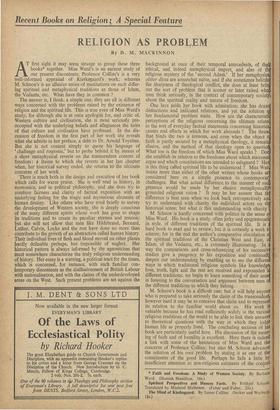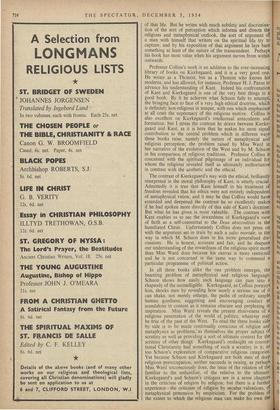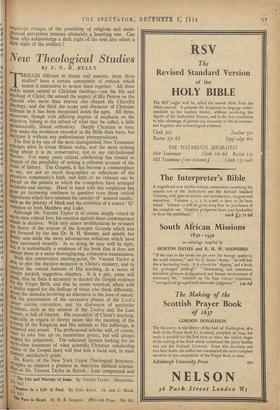Recent Books on Religion: A Special Feature
RELIGION AS PROBLEM
By D. M. MACKINNON T first sight it may seem strange to group these three books* together. Miss Ward's is an earnest study of our present discontents; Professor Collins's is a very well-informed appraisal of Kierkegaard's work; whereas M. Schuon's is an allusive series of meditations on such differ- ing spiritual and metaphysical traditions as those of Islam, the Vedanta, etc. What have they in common ? The answer is, I think, a simple one; they are all in different ways concerned with the problems raised by the existence of religion and the spiritual life. This is true even of Miss Ward's study; for although she is at once apologist for, and critic of, Western culture and civilisation, she is most seriously pre- occupied with the underlying beliefs and allegiances the heirs of that culture and civilisation have professed. In the dis- cussion of freedom in the first part of her work she reveals what she admits in her preface, a debt to Dr. Arnold Toynbee. But she is not content simply to quote his language of ' challenge and response,' but to probe behind it by means of a short metaphysical reverie on the transcendent content of freedom: a theme to which she reverts in her last chapter when, her historical survey ended, she returns to the ultimate concerns of her work.
There is much both in the design and execution of her book which calls for warm praise. She is well read in history, in economics, and in political philosophy, and she does try to combine fairness and clarity of factual exposition with an underlying feeling for the tragic and mysterious elements of human destiny. Like others who have tried briefly to survey the development of Western society, she is deeply conscious of the many different spirits whose work has gone to shape its traditions and to create its peculiar stresses and tension; but she will not allow that men like Hildebrand, Bernard. Luther, Calvin, Locke and the rest have done no more than contribute to the growth of an abstraction called human history. Their individual lives tif flesh and blood moved on other planes hardly definable perhaps, but impossible of neglect. Her historical pattern is always informed by the agnosticism that must somewhere characterise the truly religious understanding of history. Her essay is a warning, a political tract for the times, which is concerned, for instance, with such familiar con- temporary discontents as the disillusionment of British Labour with nationalisation, and with the claims of the underdeveloped areas on the West. Such present problems are set against the background at once of their temporal antecedents, of the j ethical, and indeed metaphysical import, and also of th religious mystery of the ' second Adam.' If her metaphysic obiter dicta are somewhat naive, and if she sometimes belittl the sharpness of theological conflict, she does at least brin out the sort of problem that is sooner or later raised who men think seriously, in the context of contemporary societ i about the spiritual reality and nature of freedom.
One lays aside her book with admiration; she has draw distinctions and indicated relations, and yet the solution 9 her fundamental problem waits. How are the characteristi perceptions of the religious concerning the ultimate relate to the sort of -everyday factual statements concerning historic causes and effects in which her work abounds ? The threa that binds the two is tenuous, and even when the object o faith is partly secured by a metaphysical theology, it remain elusive, and the method of that theology open to questio What too is the freedom of which Miss Ward speaks ? Doe she establish its relation to the freedoms about which statesme argue and which constitutions are intended to safeguard ? Ho is this, thing called spiritual life to be understood ? Miss War insists more than either of the other writers whose books ai considered here on a simple presence to contemporar challenges. But what actual difference to the manner of suc presence would be made by her elusive metaphysicall grounded religious vision ? It may be her answer that tilt difference is best seen when we look back retrospectively an try to understand with charity the individual actors on th historical scene; but what is this understanding with charity M. Schuon is hardly concerned with politics in the sense o Miss Ward. His book is a study, often jerky and epigrammatl in style, of different traditions of the spiritual life. It is hard book to read and to review; but it is certainly a work t admire; for in the end the author's comparative elucidation o the spiritual traditions of the Christian West and East, 0 Islam, of the Vedanta, etc., is extremely illuminating. In way the comparisons and cross-referencing of his successiv studies give a pungency to his exposition and continuall deepen our understanding by enabling us_ to see the differen ways in which traditional religious symbols Like knowledge, love, truth, light and the rest are received and expounded ill different traditions; we begin to learn something of their sensi in listening to the conversation and argument between men of the different traditions to whicli they belong. M. Schuon's book is a difficult one; but it will help anyone who is prepared to take seriously the claim of the transcendenti however hard it may be to conceive that claim and to represent its relation to the familiar world about us. His work I! valuable because he has read sufficiently widely in the varioue religious traditions of the world to be able to link their answer4 to theoretical questions with the way in which they judge human life as properly lived. The concluding sections of hie book are particularly useful here. His discussion of the mean: ing of faith and of humility is excellent. Here there is indeed a link with some of the hesitations of Miss Ward and tho concerns of Professor Collins; but also M. Schuon advance the solution of his own problem by stating it as one of the constituents of the good life. Perhaps he fails a little by insufficient attention to non-religious estimates of the content
Society. By Barbara * Faith and Freedom: A Study of Western Ward. (Hamish Hamilton. 16s.)
of that life. But he writes with much subtlety and discrimina- tion of the sort of perception which informs and directs the religious and metaphysical' outlook, the sort of argument of a man with himself that writers on the spiritual life try to capture; and by his exposition of that argument ha lays bare something at least of the nature of the transcendent. Perhaps his book has most value when his argument moves from within outwards.
Professor Collins's work is an addition to the ever-increasing library of books on Kierkegaard, and it is a very good one. He writes as a Thomist, but as a Thomist who knows his moderns, and has allowed, for instance, Professor H. J. Paton to advance his understanding of Kant. Indeed his confrontation of Kant and Kierkegaard is one of the very best things in a good book. By it he achieves what Schuon fails to attempt, the bringing face to face of a very high ethical doctrine, which is definitely non-religious in temper, with one which emphasises at all costs the supremacy of the religious motive. Collins is also excellent on Kierkegaard's intellectual antecedents and formation; but I stress the contrast he draws between Kierke- gaard and Kant, as it is here that he makes his most signal contribution to the central problem which in different ways these books raise, namely the nature of metaphysical and religious perception; the problem raised by Miss `Ward in her narrative of the evolution of the West and by M. Schuon in his, comparison of religious traditions. Professor Collins is concerned with the spiritual pilgrimage of an individual for whom the religious revealed itself as ultimately authoritative in contrast with the aesthetic and the ethical.
The contrast of Kierkegaard's way with the ethical, brilliantly interpreted in the moral philosophy of Kant, is utterly crucial. Admittedly it is true that Kant himself in his treatment of freedom revealed that his ethics were not entirely independent of metaphysical vision; and it may be that Collins would have extended and deepened the contrast he so excellently makes if he had, spoken more directly of this side of Kant's doctrine. But what he has given is most valuable. The contrast with Kant enables us to see the inwardness of Kierkegaard's view of faith as a self-committal to the Deus absconditus in the humiliated Christ. Unfortunately Collins does not press on with the argument set in train by such a salto inortale, in the way in which M. Schuon does in his more generalised dis- cussions. He is honest, accurate and fair, and he deepens our understanding of the inwardness of the religious spirit more than Miss Ward does because his canvas is more restricted and he is not concerned in the same way to commend a particular programme of political action. • In all three books alike the one problem emerges, the besetting problem of metaphysical and religious language. Schuon shows how easily such language can pass into a rhapsody of the unintelligible. Kierkegaard, as Collins portrays him, shocks men by revealing how nearly a serious use of it can shake, not merely enlarge, the paths of ordinary simple human goodness, suggesting and encouraging conduct as scandalous in content as it remains obscure and perplexing in inspiration. Miss Ward reveals the present elusiveness of a religious penetration of the world of, politics, whatever may be true of the past of the West. To read the three books side by side is to be made continually conscious of religion and metaphysics as problems, as themselves the proper subject of scrutiny as well as providing a sort of ultimate context for the scrutiny of other things. Kierkegaard's onslaught on conven- tional Christianity had something of such a scrutiny in it; so too Schuon's exploration of comparative religious categories. Yet because Schuon and Kierkegaard are both men of deer religious preoccupation, neither succeeds in raising, as perhaps Miss Ward unconsciously does, the issue of the relation of the familiar to the unfamiliar, of the relative to the ultimate. Kierkegaard's and Schuon's critiques are in a sense chapters in the criticism of religion by religion; but there is a further experience—the criticism of religion by secular valuations, of metaphysical pretension by empiricism. For the problem of the extent to which the religious man can make his own the empiricist critique of the possibility of religious and meta- Physical perception remains ultimately a besetting ono. Can those who acknowledge a dark night of the soul also admit a dark night of the intellect












































 Previous page
Previous page